What Is Distillate Weed?
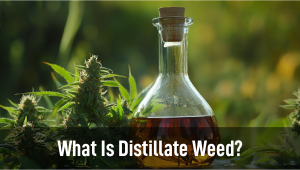
- 1. What is thc distillate?
- 2. How is distillate weed made?
- 3. Does distillate get you high?
- 4. Distillate weed vs flower
- 5. How do you consume distillate weed?
- 6. What to keep in mind when purchasing distillate weed?
- 7. Pros and cons of weed distillate
- 8. Side effects and risks of weed distillate
- 9. In conclusion
- 10. Distillate weed faqs
Distillation is a common process used to extract alcohol from various sources by applying temperature and pressure fluctuations to reduce the starting material to a single component. In more recent times, you may have heard about distillate weed or distillate oil…but what exactly is it?
Distillate is a highly potent, purified cannabis product that can exceed 90% THC in potency, typically appearing as a golden liquid or a glassy solid slab. But that’s just the tip of the iceberg. If you want to learn more about its production process, characteristics, and the various consumption methods, read on!
What is THC distillate?
Distillate is the final product resulting in the processing of cannabis oil to the point it reaches its purest form. Basically, all the aggregates have been removed and you’re left with cannabinoid, CBD and THC.
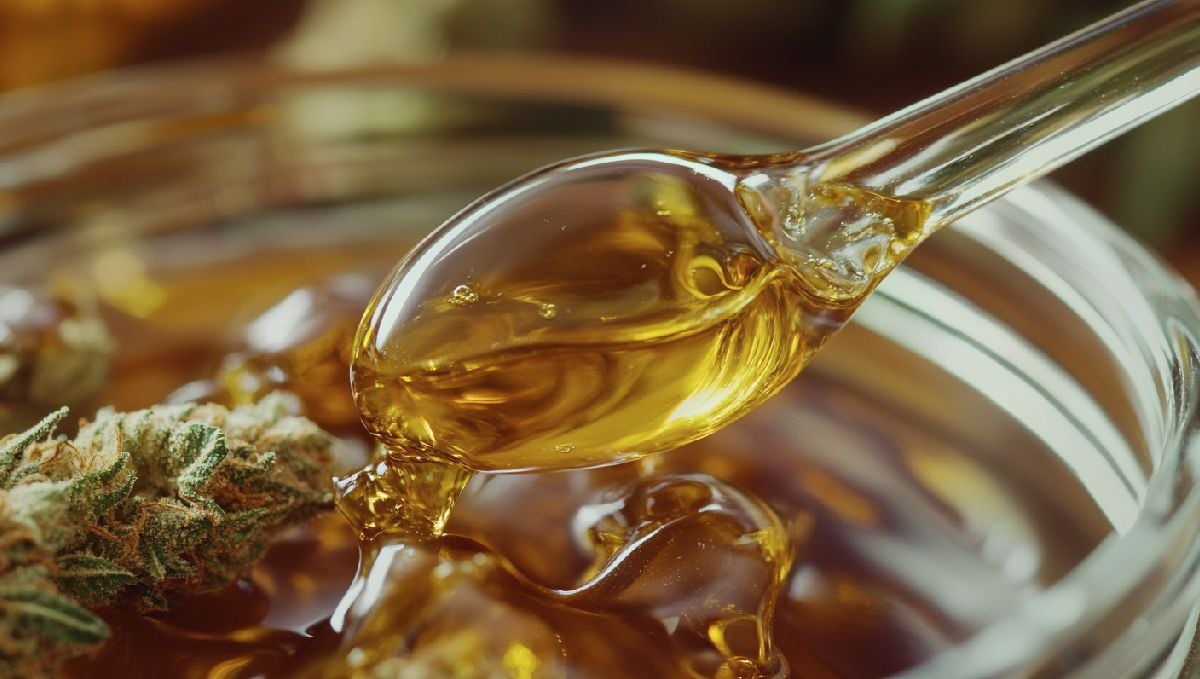
The result is a concentration of 90-100% level of purity of the cannabinoids in a flavorless, and often lacking in aroma, oil. However, distillates can still be modified to the point of adding terpenes to enhance the taste.
How is distillate weed made?
Distillate weed is definitely something you wouldn’t be able to make at home. The process is complicated and it requires a lab, professional equipment and in depth knowledge of the cannabis plant. Describing the full process of distillation of weed would take too much time, but here’s a general overview:
| Step | Process |
|---|---|
| Extraction | Using extraction methods such as CO2, ethanol or hydrocarbon, experts extract the THC from the cannabis buds. |
| Winterization | Next, starts the process of separating the fats, lipids and waxes from the THC through freezing the raw extracts with ethanol. |
| Filtration | This step removes the impurities through filtering. |
| Evaporation | The resulting solution goes through a process of heated rotary evaporation where they get rid of the ethanol. |
| Decarboxylation | Decarboxylation is the process of converting the THCA oils into psychoactive THC by using heat. |
| Distillation and Refinement | The resulting oil is then distilled with heat, along with a vacuum that condenses and evaporates the oil. |
Note: The temperature during the distillation and refinement step varies based on the required levels of purity. Moreover, during the refinement stage, some more steps can be applied such as molecular distillation.
Does distillate get you high?
Simply put, yes, you can definitely experience a high when consuming distillate. However, the way it manifests depends on the type of cannabinoids distilled. Meaning, if you consume CBD distillate, then you’ll enjoy the medicinal and therapeutic benefits, but if you consume THC distillate, then you’ll feel the psychoactive cerebral effects.
Distillate weed vs flower
The difference between distilled weed and flowers lies mostly in the power of the high. While distilled THC is much more powerful than the flower due to the high level of purity, it can lead to extremely strong effects, often staggering.
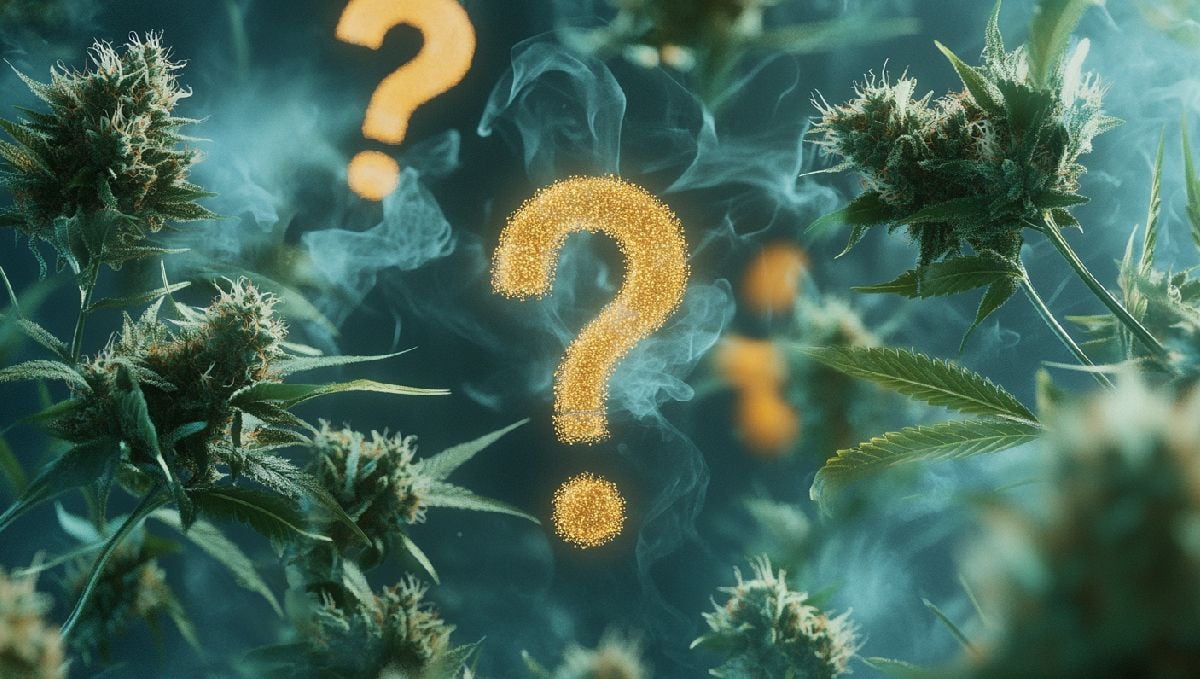
The flowers, while not as pure, ranging from 15 to 30% in THC content, provide a much more pleasant experience thanks to the terpenes and flavonoids content.
How do you consume distillate weed?
Distillate is flexible and can be consumed and used in plenty of ways. But let’s see which are the main ones:
Dabbing
Dabbing, or dab rig, is an excellent way to consume distillate weed. In fact, it’s the same process for when you’re consuming concentrates. Heat up the nail with a lighter or a blowtorch, add a small drop of distillate and inhale.
Vaping
Quite self-explanatory, add some distillate into the vape and inhale.
Edibles
Since distillates are already processed through decarboxylation, you can easily add 2-5 ml into your foods with no issues ahead.
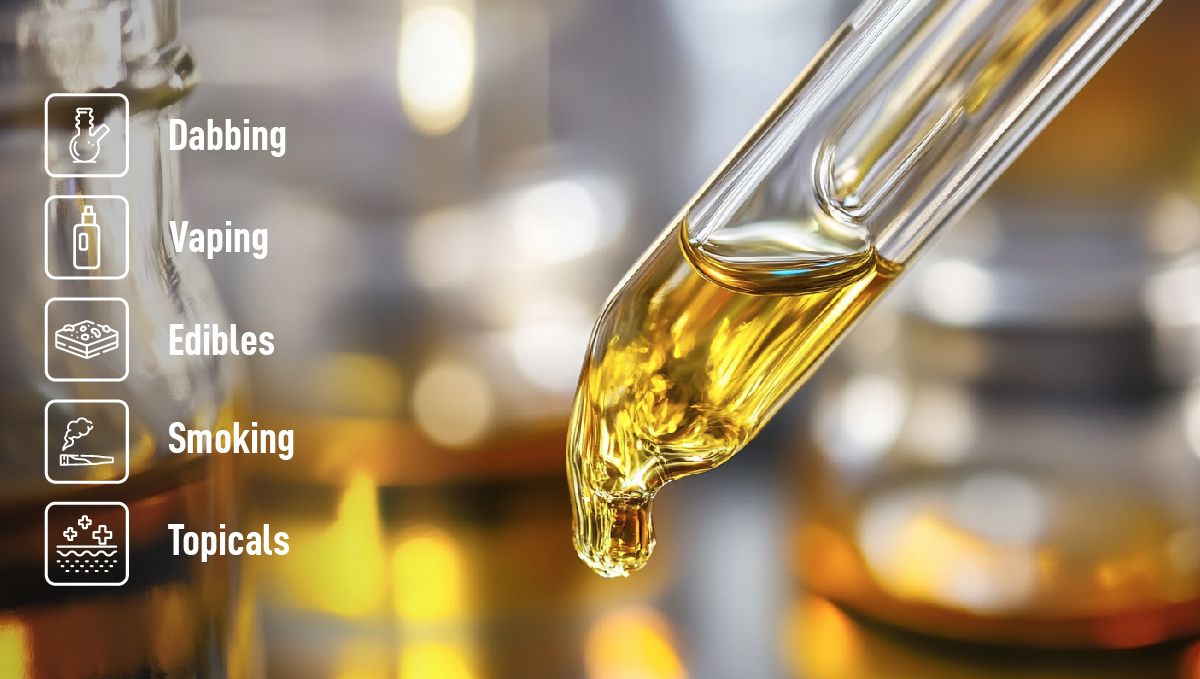
Smoking
Weed distillate is an oil so adding it to your weed before you roll up a joint, will raise up the effects in no time.
Topicals
Topicals are a great way to enjoy the external benefits of THC distillate. To enjoy the treatment effects on skin conditions or other types of uncomfortable pain, try to mix it with your usual daily body ointment.
What to keep in mind when purchasing distillate weed?
Purchasing distilled weed you need to take care of a few things to ensure you get the best product possible. So here’s what you need to take into account:
- If the price is too good to be true, then you better skip it. Extremely low prices are often an indication of extremely poor quality.
- Don’t buy them from anyone. Go to licensed dispensaries that can guarantee the production of the distilled weed.
- Request relevant documentation to make sure you know the full contents of the oil as well as its true potency and profile.
- Take the reviews into consideration and listen to the feedback of others.
Pros and Cons of Weed Distillate
Pros
There are quite a few benefits to using distillates instead of cannabis buds or other products. Obviously, there’s the concentration of cannabinoids that’s the highest it can get. Then, we also need to mention the lack of smell when you vape it. Distilled weed can definitely allow you to enjoy the high in many forms. And perhaps the best part: you experience the purest form of cannabis available.
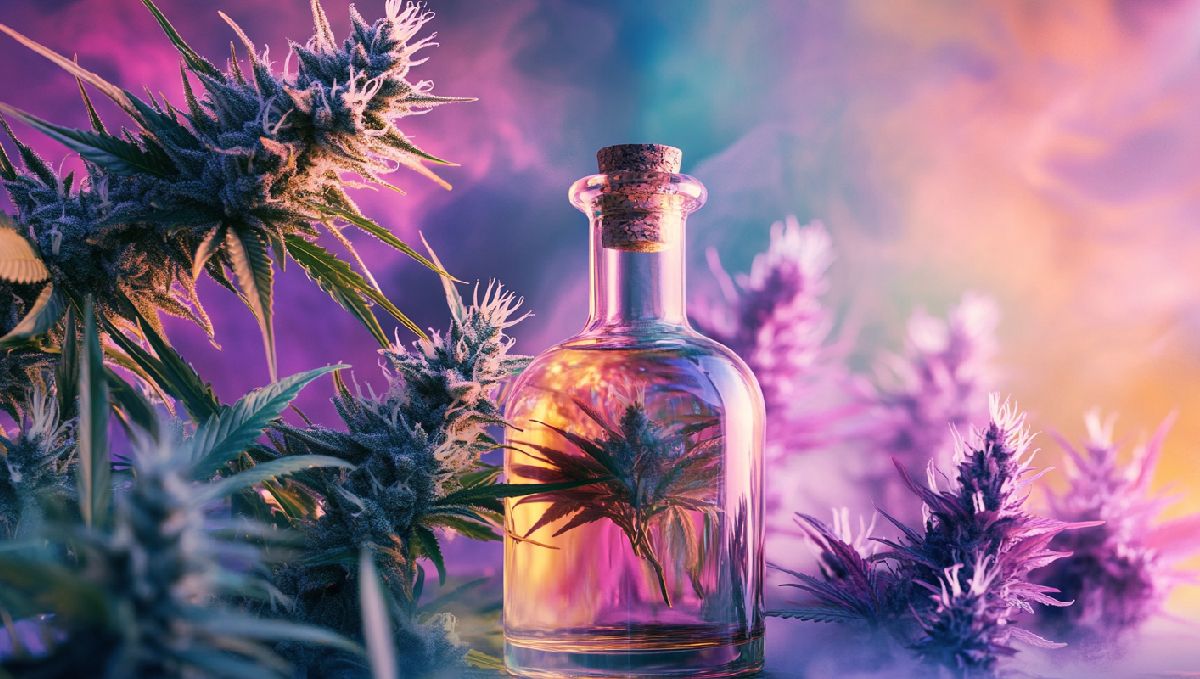
Cons
Weed distillate might be hard to meThen asure and although many consumers are quite generous with their dosage, in the case of distillates it’s not a good thing. If you use too much, then the effects will be too strong and the experience will be ruined. it’s the high purchase price that can be considered a negative point.
Side effects and risks of weed distillate
Weed distillate is definitely not a product designed for new cannabis consumers due to the risks of getting overwhelmed. Also, weed distillate with solely THC doesn’t have the same relieving effects cannabis usually has. So you’ll be enjoying solely the psychedelic effects.
In Conclusion
Distillates are a very versatile product resulting in processing flowers. The purest form of cannabis that allows you to reach a whole new level of high. But thread carefully if you're a beginner because the effects can turn into a negative experience in a matter of seconds.
Distillate Weed FAQs
What’s the difference between distillate and other concentrates?
Concentrates are not as strong as distillates and also contain more terpenes and flavonoids, so you’ll enjoy a more flavorful experience. Distillates, on the other hand, are stronger and the purest form of cannabis oil that’s either high on CBD or on THC.
What’s the best way to store distillate?
As it’s the case for almost all cannabis products, the best way to store it is in a dark cool place, in an airtight container.
Does distillate get you more high?
Yes, that’s due to the high content of THC and its levels of purity. That’s why it’s not recommended for newbies.
Is weed distillate the same as dabs?
Distillates are much more processed than dabs so they’re definitely not the same thing. Dabs, on the other hand, can have more or less, cannabinoids and terpenes
Can you eat distillate weed?
Yes, you can add small doses of weed distillate in any food or beverage to enjoy the effects without changing the taste or flavor of your foods.







Comments